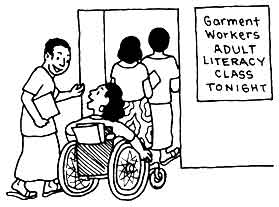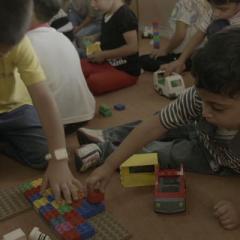Your progress
0%
The activities below can help you work with persons with disabilities so that they can benefit from lifelong learning opportunities.

Use your mouse or keyboard to expand each of the activity headings below. To add an activity to your action plan, select the Add button beside it. Once you have added an activity to your action plan, select Action plan > My action plan from the menu above to complete that activity.

CBR personnel are ideally placed to act as liaison between students with disabilities and families, employers, trainers and self-advocacy groups. The transition from school to work or to further skills training and increased independence can be very challenging if unsupported. CBR personnel can help identify and advise on available careers and peer counselling opportunities, and ensure that they are accessible, relevant and effective. CBR can also involve organizations of people with disabilities in advising and assisting young people to develop confidence and skills to make their own choices and to direct their own learning.
The following is a video about how CBR in the West Bank and Gaza Strip provided support for a young woman during transition periods in her life.
Select Learn more to watch this video. As you watch, think about the traits and characteristics that enabled this young woman to overcome the series of obstacles she faced. Notice also what the CBR programme did to support and enhance these inner strengths.
Learn about how a young woman in Palestine received the support she needed for the transitions in her life.

Many adults with disabilities may face a variety of barriers in accessing formal or continuing education, including:
CBR can identify and create opportunities for adult literacy and adult education through open schooling within the wider community.
Learn about how CBR helped to enrol a young woman in open schooling.


Maya successfully completed the first three grades in school because there were no written examinations. However, at age 10, the school authorities forced her to leave school because of her visual, intellectual, and physical disabilities. She went to an association of blind people for advice, and the association helped her enrol in an open school. There, Maya completed her higher secondary examination over a period of 13 years. Afterwards she took part in vocational training, a computer course, and other classes that taught social skills. Today, Maya is trained in flower arrangement and artificial flower making. She still takes part in classes at the open school according to her needs and interests.
Continuing education opportunities are becoming increasingly available through local educational institutions, distance education and web-based educational programmes. Distance education can often eliminate barriers such as:
Distance education can enable people with disabilities to benefit from higher education. CBR personnel need to be aware of these developments and be equipped to help people with disabilities to take advantage of the benefits they offer.
Learn about how a young woman from Malaysia participated in distance education.


Yusof is a young woman living in Georgetown, Malaysia. She became paralyzed at age 13. However, she always wanted to get a degree and set an example for her seven siblings. So, she enrolled in a distance learning programme at a university to study literature, where she studies online through video and self-learning modules.